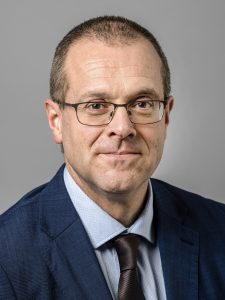Hans Kluge, WHO Regional Director for Europe, in an interview on the major crises faced by Europe and the world today and why we need to work together more than ever to tackle them.
Interview: Dietmar Schobel
HEALTHY EUROPE
We are currently dealing with the COVID-19 pandemic, the war in Ukraine and the consequences of climate change. Is Europe in a “permacrisis”?
Hans Kluge: If you look back well over a century, Europe – and indeed the world – has grappled with a range of crises, including pandemics and outbreaks, world wars and multiple disasters. However, in recent years we have witnessed a greater frequency of crises linked to climate change, accompanied by a larger number of emerging infectious diseases arising from animals. These are diseases that frequently pose a global threat, with an ever faster spread in our interconnected world. So a “permacrisis”, as you put it, is indeed part and parcel of the “New Normal”. The extreme heat and wildfires that have devastated swathes of Europe this summer are but one example, driving home the reality of the climate crisis beyond a doubt. Additionally, we are facing the ongoing COVID-19 pandemic, and also the current monkeypox scenario which is another public health emergency of international concern. Last but not least, we have the war in Ukraine – a humanitarian catastrophe. These challenges, and many others, may seem daunting. But that does not mean we should surrender. Instead, all stakeholders – governments, health partners including WHO, the wider UN system, civil society – need to work together more than ever. We can – and should – tackle the “permacrisis” together in practical ways that benefit all.
We can – and should – tackle the “permacrisis” together in practical ways that benefit all.
HANS KLUGE, WHO REGIONAL DIRECTOR FOR EUROPE
HEALTHY EUROPE
What are the consequences of these three crises for the health and well-being of Europeans?
Hans Kluge: COVID-19 is far from over, and I am concerned about the fact that millions of people remain unvaccinated even as many countries are reducing surveillance for the virus. Our recently released WHO/Europe 2022 autumn and winter COVID-19 strategy emphasises what countries and individuals alike need to do urgently. Turning to Ukraine, WHO/Europe is truly grateful for the support of EU Member States and other donors in our response efforts. Along with partners, we support the Ukrainian Ministry of Health and other stakeholders on the ground. When it comes to the climate crisis, a lot has been written and said, and at this danger point words are superfluous. Ultimately, this summer’s extreme weather events point yet again to the desperate need for pan-European and cross-sectoral action to effectively tackle climate change. Earlier this summer, UN Secretary-General António Guterres issued a stark warning: “We have a choice. Collective action or collective suicide. It is in our hands.”
HEALTHY EUROPE
Has the COVID-19 pandemic awarded the health sector greater importance in national, European, global politics?
Hans Kluge: In short, the answer is a definite yes. Health has been placed higher on national, regional and global political and development agendas, accompanied by greater collaboration between countries and regional blocs like the EU. Partnerships for health are already bearing fruit when it comes to addressing the monkeypox outbreak. We are also witnessing such health partnerships and investments when it comes to responding to the war in Ukraine. But much more needs to be done to truly elevate health to the level it deserves. Here I am specifically calling for the European Region to strategise on and kindle a Primary Health Care Movement; invest wisely and sustainably in the healthcare workforce across our Member States; and work with WHO in strengthening the science and evidence base.
13 of 44 countries have a workforce in which 40 percent of medical doctors are already aged 55 or older.
HANS KLUGE, WHO REGIONAL DIRECTOR FOR EUROPE
HEALTHY EUROPE
What should be done to address the problem of healthcare worker shortages?
Hans Kluge: Healthcare worker shortages were a crisis even before the pandemic. In our newly-released report on the state of the health and care workforce in our Region, 13 of 44 countries that have reported data on this issue have a workforce in which 40 percent of medical doctors are already aged 55 or older. To address this looming crisis, countries should collaborate to swiftly strategise on, and implement, policies that replace ageing health workers with a new cohort, recruiting nationally and internationally. Our new WHO/Europe report on health workforce strategy provides a range of possible solutions.

Hans Henri P. Kluge has been WHO Regional Director for Europe since February 2020. He has 25 years of experience in medical practice and public health in numerous settings around the world. He began his career as a family doctor in Belgium and worked for Médecins Sans Frontières (MSF) Belgium from 1995 in Liberia, Somalia and Russia. In 1999 Hans Kluge joined the World Health Organization (WHO) as Tuberculosis (TB) and TB-HIV Project Manager for the WHO Country Office in Moscow. The WHO European Region covers a vast geographical region from the Atlantic to the Pacific oceans. It comprises 53 countries from Albania and Andorra to Ukraine and Uzbekistan.
